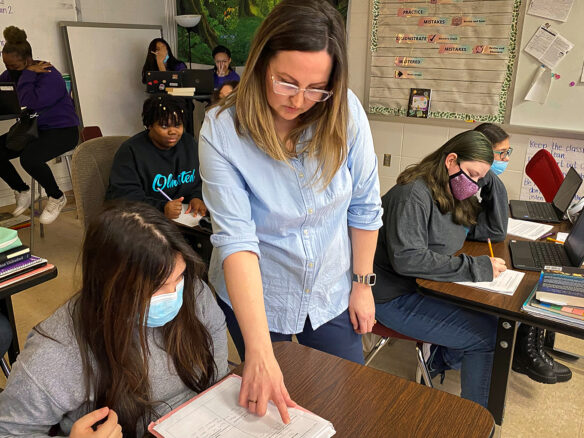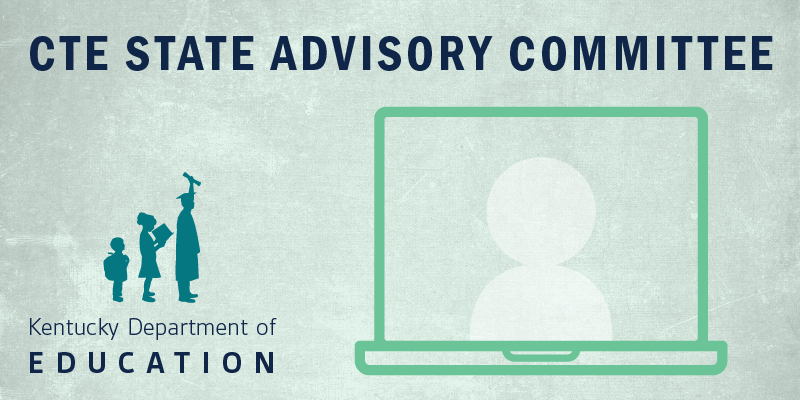
Stephanie Roederer has spent 11 of her 15 years as a teacher at Olmsted Academy South in Jefferson County. She was one of 104 teachers that were honored as newly-designated National Board Certified Teachers (NBCTs) in February.
Photo submitted by Stephanie Roederer
Stephanie Roederer remembers just how difficult life was as a student in middle school.
“Middle school for girls is a brutal time because girls, as they’re developing their identity, there’s a lot of comparing themselves to others,” she said, “and sometimes that comparison does not come out in the most flattering of ways and they’re not always kind to each other.”
Roederer became a teacher 15 years ago and started working at Olmsted Academy South, an all-girls middle school in Jefferson County Public Schools, as an English language arts teacher 11 years ago. Her experience growing up was what drove her to the classroom; to help other girls through the same issues she dealt with at that age.
“I don’t understand how boys think quite as well, but I understand girls and their emotions and mood swings and all of those things; all of the turmoil that’s going on underneath the surface,” she said. “I get it because I lived it, so it’s just a little bit easier to build a relationship and mentor them.”
But it wasn’t a path she went down right away. Roederer said she was working in an office setting for three years after college.
“I just felt like I wasn’t doing anything productive that was going to matter in 10, 20, 30 years from now,” said Roederer. “So I decided I wanted to do something more important.”
And from an early age, John Keating, a teacher played by Robin Williams in the movie “Dead Poets Society,” really resonated with her.
“He was kind of this outside-the-box thinker and got (his students) to appreciate poetry and the things that make life more meaningful,” she said. “And that’s why I really came into this; because words and ideas matter, and teaching kids how to use them, to me, matters.”
Roederer was one of 104 Kentucky teachers honored in February for being newly certified by the National Board for Professional Teaching Standards (NBPTS). It was the 9th-largest class of new National Board Certified Teachers (NBCTs) in the country this year.
“Kentucky has long been a national leader in the number of our teachers earning their National Board certification,” said Education Commissioner Jason E. Glass. “This process is rigorous, it’s intense, it’s challenging and it’s time-consuming, but it’s also rewarding and provides a direct benefit to our students. The fact that so many of our educators have chosen to go through this process is proof enough that our Commonwealth has exemplary education professionals.”
The class joins a group of 4,283 teachers across the Commonwealth who have gone through the NBCT process. Kentucky ranks 8th in the country with the total number of NBCTs.
National Board certification is voluntary and open to all teachers who have at least three years of classroom experience and a teaching license. Certification is available in 25 certificate areas, from preschool through 12th grade.
Roederer began her application for NBCT in May 2020 – just a couple months into the COVID-19 pandemic – which she said actually gave her more time to compile everything she needed for the process.
“I didn’t have to do any classroom management and the circumstances of how we work were different,” Roederer said, “so it was a little bit easier to think about things like writing reflections and things like that.”
Roederer and every other NBCT applicant have to complete four components:
- Content knowledge: A computer-based assessment asking applicants about their understanding of the content they teach and the pedagogy surrounding their lessons.
- Differentiation in instruction: Submitting work samples that demonstrate student growth and a written analysis of the applicant’s instructional choices.
- Teaching practice and learning environment: A classroom-based portfolio that includes video recordings of the teacher’s interactions with students.
- Effective and reflective practitioner: Demonstrating evidence of the applicant’s abilities in developing and applying knowledge of their students, the use of assessments to plan and positively impact student learning, and collaboration to advance student learning and growth.
Roederer credited Jefferson County’s Professional Development and Learning office staff with helping her compile each of the components of her application.
There were a few things Roederer considered when she pondered whether to apply for certification or not, but a big factor was money. NBCTs are entitled to an annual $2,000 salary bonus for the life of their certificate, plus they get a bump in their rank status.
Roederer earned her certification in December following a process where she was tested on her knowledge of the subject matter she teaches and critiqued on her skills in the classroom. She said other teachers should consider applying because the process itself makes you a better educator.
“You basically explain all the choices that you make,” she said. “So, that process of having to really think intentionally about what you’re doing… I think it makes you a stronger teacher in the process.”
And on top of the money and networking opportunities with other NBCTs that are now available, Roederer said the simple validation a NBCT designation brings has been one of the most noticeable perks.
“So, when I’m struggling or having a particularly frustrating day or something, that reminds me you know what you’re doing,” she said. “You’ve proven that you know what you’re doing.”




Leave A Comment